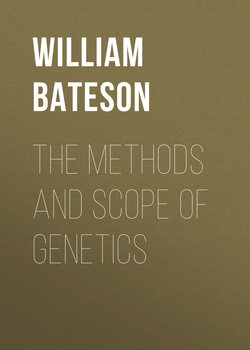The Methods and Scope of Genetics

Реклама. ООО «ЛитРес», ИНН: 7719571260.
Оглавление
Bateson William. The Methods and Scope of Genetics
PREFATORY NOTE
THE METHODS AND SCOPE OF GENETICS
Отрывок из книги
The opportunity of addressing fellow-students pursuing lines of inquiry other than his own falls seldom to a scientific man. One of these rare opportunities is offered by the constitution of the Professorship to which I have had the honour to be called. That Professorship, though bearing the comprehensive title "of Biology," is founded with the understanding that the holder shall apply himself to a particular class of physiological problems, the study of which is denoted by the term Genetics. The term is new; and though the problems are among the oldest which have vexed the human mind, the modes by which they may be successfully attacked are also of modern invention. There is therefore a certain fitness in the employment of this occasion for the deliverance of a discourse explaining something of the aims of Genetics and of the methods by which we trust they may be reached.
You will be aware that the claims put forward in the name of Genetics are high, but I trust to be able to show you that they are not high without reason. It is the ambition of every one who in youth devotes himself to the search for natural truth, that his work may be found somewhere in the main stream of progress. So long only as he keeps something of the limitless hope with which his voyage of discovery began, will his courage and his spirit last. The moment we most dread is one in which it may appear that, after all, our effort has been spent in exploring some petty tributary, or worse, a backwater of the great current. It is because Genetic research is still pushing forward in the central undifferentiated trunk of biological science that we confess no guilt of presumption in declaring boldly that whatever difficulty may be in store for those who cast in their lot with us, they need fear no disillusionment or misgiving that their labour has been wasted on a paltry quest.
.....
Now obviously the diversity of form which is characteristic of the animal and plant world must be somehow represented in the gametes, since it is they which bring into each organism all that it contains. I am aware that there is interplay between the organism and the circumstances in which it grows up, and that opportunity given may bring out a potentiality which without that opportunity must have lain dormant. But while noting parenthetically that this question of opportunity has an importance, which some day it may be convenient to estimate, the one certain fact is that all the powers, physical and mental that a living creature possesses were contributed by one or by both of the two germ-cells which united in fertilisation to give it existence. The fact that two cells are concerned in the production of all the ordinary forms of life was discovered a long while ago, and has been part of the common stock of elementary knowledge of all educated persons for about half a century. The full consequences of this double nature seem nevertheless to have struck nobody before Mendel. Simple though the fact is, I have noticed that to many it is difficult to assimilate as a working idea. We are accustomed to think of a man, a butterfly, or an apple tree as each one thing. In order to understand the significance of Mendelism we must get thoroughly familiar with the fact that they are each two things, double throughout every part of their composition. There is perhaps no better exercise as a preparation for genetic research than to examine the people one meets in daily life and to try in a rough way to analyse them into the two assemblages of characters which are united in them. That we are assemblages or medleys of our parental characteristics is obvious. We all know that a man may have his father's hair, his mother's colour, his father's voice, his mother's insensibility to music, and so on, but that is not enough.
Such an analysis is true, inasmuch as the various characters are transmitted independently, but it misses the essential point. For in each of these respects the individual is double; and so to get a true picture of the composition of the individual we have to think how each of the two original gametes was provided in the matter of height, hair, colour, mathematical ability, nail-shape, and the other features that go to make the man we know. The contribution of each gamete in each respect has thus to be separately brought to account. If we could make a list of all the ingredients that go to form a man and could set out how he is constituted in respect of each of them, it would not suffice to give one column of values for these ingredients, but we must rule two columns, one for the ovum and one for the spermatozoon, which united in fertilisation to form that man, and in each column we must represent how that gamete was supplied in respect of each of the ingredients in our list. When the problem of heredity is thus represented we can hardly avoid discovering, by mere inspection, one of the chief conclusions to which genetic research has led. For it is obvious that the contributions of the male and female gametes may in respect of any of the ingredients be either the same, or different. In any case in which the contribution made by the two cells is the same, the resulting organism – in our example the man – is, as we call it, pure-bred for that ingredient, and in all respects in which the contribution from the two sides of the parentage is dissimilar the resulting organism is cross-bred.
.....